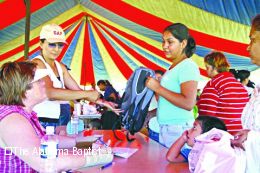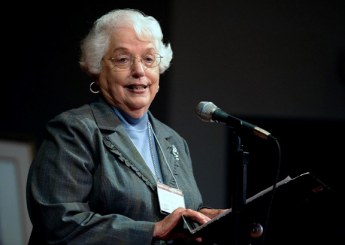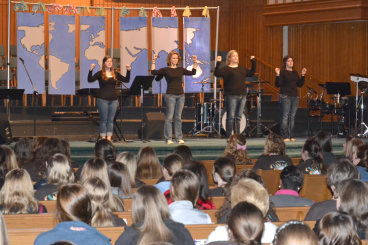Nearly 200 pairs of boys’ jeans for $4 each.
Nine hundred backpacks for $4.20 each.
Nearly 900 patients receiving free medical and dental checks.
And, the most significant number of all from California Baptists’ “Feeding Those Who Feed Us” (FTWFU) ministry last summer: 1,165 professions of faith.
The shoes and backpacks are among many items that Tom Stringfellow, who works year-round with the FTWFU ministry, collects during the off-season when they can be purchased at deep discounts. The items are held at a storage facility then made available for churches and associations to distribute to migrant children during the summer.
In its 10th year, the ministry was born out of First Baptist Church, Beverly Hills, Calif., where Stringfellow was pastor before becoming director of missions for Sierra Butte Baptist Association. The initiative continues to grow, particularly in the current baleful economy — and particularly in seasons like last summer in which the harvest was delayed by an unusually cool and late spring.
“The weather made crops not mature enough to pick, and the delay had a real impact on workers,” Stringfellow said. “We went to lots of places where men were sitting around the home when they should’ve been out working. And sometimes the schedule we work off of put us in places before workers had even arrived. In Yuba City, for instance, the migrant center was only half full.”
FTWFU, which involved more than 130 churches in 2011, is conducted primarily at California’s state-operated migrant centers — an unlikely alliance at first glance.
Stringfellow explained that the first year, “I went to five locations before I found one that would let me on the gated property. We were giving away new shoes, shirts and pants to every child, putting food in the house and holding a Vacation Bible School. Finally, one center invited me back to a meeting … and had me present what we were going to do. They said if the migrants approve it, it’s okay with the state of California.
“Well, without hesitation, with a standing ovation, they approved it,” Stringfellow said. “State officials said it was okay so long as no one was forced.”
Only legal migrant workers with families are allowed to live in these centers, removing one potential complication involved with migrant ministry. Most centers host around 90 households, the majority of them in two-bedroom units with five to six people per unit. Most families have two or three children under the age of 12 who must change public school every time their parents relocate, following the seasonal crops — from peaches in California to apples in Washington.
FTWFU retains its original elements from the first year — a new pair of shoes, two shirts, a pair of pants and a backpack for each child, food for the family and a Vacation Bible School with an evangelistic emphasis — yet has expanded over the years to include, in many places, free medical and dental clinics, block parties, sports camps and more.
“From the churches that participate, we try to get $3,500 per migrant center,” Stringfellow noted. “Last year when I spoke at the ‘Tsunami’ student conference [sponsored by the state convention], the youth there raised just short of $7,000 for the project, and some went back and got their churches on board. That was really neat.
“And the California Mission Offering has now put us in, with a little bit left over from this year, and a couple of churches have been very generous. We buy collectively with that money. Otherwise you couldn’t afford to do it.
“It’s a year-round job for me and Oscar!” Stringfellow added, referring to Oscar Sanchez, California Southern Baptist Convention migrant ministries field specialist.
Sanchez was at the Merced migrant center with the California convention’s Mobile Medical Clinic in late June. “While we were at the clinic,” he said, “someone from the center came running to tell us there was an emergency. An older woman from the center had just fainted from heat exhaustion.
“Dr. Michael, a volunteer doctor, immediately went over to attend to this lady’s situation. He was able to help her, and her family was very grateful to the doctor.
“Situations like this — helping people with no medical insurance — make this ministry worthwhile,” Sanchez said.
(BP)





Share with others: